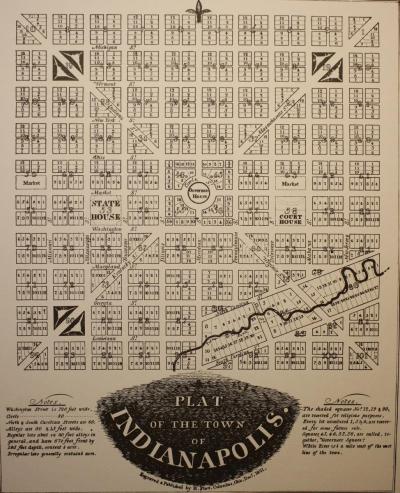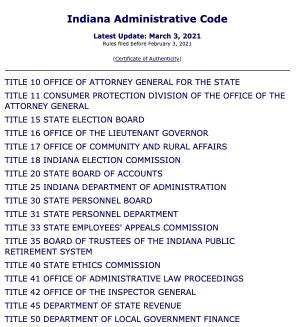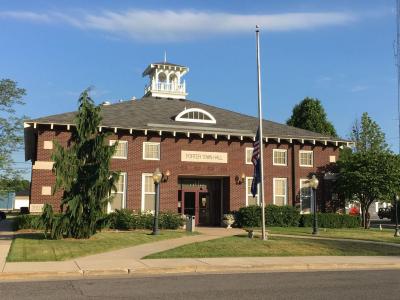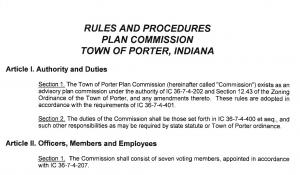About The Plan Commission
Plan Commission: Why Have A Plan?
 From the earliest settlements, communities in the United States have been laid out according to plans. In Indiana, Jeffersonville was originally laid out in 1802 according to a plan based upon ideas formulated by Thomas Jefferson. Since 1816, Indianapolis's streets radiating from the circle at city center adhered to a design by Alexander Ralston, the surveyor for Washington, D.C.
From the earliest settlements, communities in the United States have been laid out according to plans. In Indiana, Jeffersonville was originally laid out in 1802 according to a plan based upon ideas formulated by Thomas Jefferson. Since 1816, Indianapolis's streets radiating from the circle at city center adhered to a design by Alexander Ralston, the surveyor for Washington, D.C.
 The Indiana legislature created the legal framework for planning communities and counties. Indiana’s plan commissions are enabled and governed by Indiana Code IC 36-7-4. The primary duty of Indiana's plan commissions is to develop and recommend to the legislative body - in our case it is the Porter Town Council - a plan for the future of the community. Based on that plan, the Commission recommends development and updates to the town's zoning ordinance and zoning map. The Commission also hears requests for subdivisions and rezoning.
The Indiana legislature created the legal framework for planning communities and counties. Indiana’s plan commissions are enabled and governed by Indiana Code IC 36-7-4. The primary duty of Indiana's plan commissions is to develop and recommend to the legislative body - in our case it is the Porter Town Council - a plan for the future of the community. Based on that plan, the Commission recommends development and updates to the town's zoning ordinance and zoning map. The Commission also hears requests for subdivisions and rezoning.
The goal of the planning process is to guide investment in the community, protect property values, and provide safe streets and environment. The planning process the legislature codified ensures the needs of the whole community are considered, not just the benefits to individuals.
What Does The Commission Do?
The Plan Commission's responsibilities are:
- Preparing a Comprehensive Plan

- Preparing a zoning ordinance and a subdivision control ordinance
- Making recommendations to the legislative body on proposals to amend the text of the zoning ordinance or subdivision control ordinance
- Making recommendations to the legislative body on proposals to amend the zoning map
- Approving or denying proposals to subdivide land, based upon compliance with the subdivision control ordinance
- Approving development plans
How Does The Commission Work?
Membership
As established by Indiana law, the Porter Plan Commission has seven voting members.
- Four are members of the public of whom no more than two may be of the same political party.
- Three members are elected officials or town employees.
Terms are staggered to maintain continuity on the Commission. If you are interested in serving, contact the Town Council President. The Commission is aided in its work by an attorney, a secretary and other assistance as needed from the town staff.
Meetings
The work of the Plan Commission takes place during the monthly meetings held the third Wednesday of every month. The calendar of meetings, along with agendas and minutes, are available on this website. Commission meetings are governed by Indiana's Open Door Law. The public is invited and encouraged to attend and time is made in each meeting for the public to speak. For issues that require public hearings, notice is posted in the NWI Times newspaper and on this website.
 Rules & Procedures
Rules & Procedures
The Commission processes are laid out in the Commission's Rules and Procedures, viewable here.
It operates in compliance Indiana's enabling code, Porter's Code of Ordinance Article V Section 2-127, Indiana's Open Door Law.
Comprehensive Plan Review and Update
The Comprehensive Plan establishes policies to guide growth in the community. It is a document drafted by the Planning Commission with public input. The draft is then reviewed at public hearings, and submitted to the Town Council for review and final decision. The Plan must include objectives for future development in the town, policy for land use development, and policy for the development of public ways which include public places, public lands, public structures, and public utilities. The scope may cover parks and recreation, flood control, transit, natural resource protection, conservation, flood control, farmland protection, education, health and wellness, character and identity, and redevelopment of blighted areas. Recommendations may include changes to the Zoning Map and Code of Ordinances. The entire plan is subject to Town Council approval.
By our Commission's Rules and Procedures, the Plan Commission reviews the Comprehensive Plan at least every other year, in January of odd-numbered years. When changed conditions warrant it, the Plan Commission will recommend a revision of the Comprehensive Plan.
In all of its proceedings, the Plan Commission is directed to refer to the Comprehensive Plan for guidance whenever petitions request changes beyond what the approved Code of Ordinances and Zoning Map allow.
Deciding and Reviewing Petitions
Citizens and businesses requesting consideration of a matter involving the Plan Commission must submit a petition. Contact the Office of the Clerk-Treasurer at City Hall to learn about the process and get the correct forms. All petitions are considered at public Plan Commission meetings. All required materials must be submitted at least ten days prior to a meeting.
